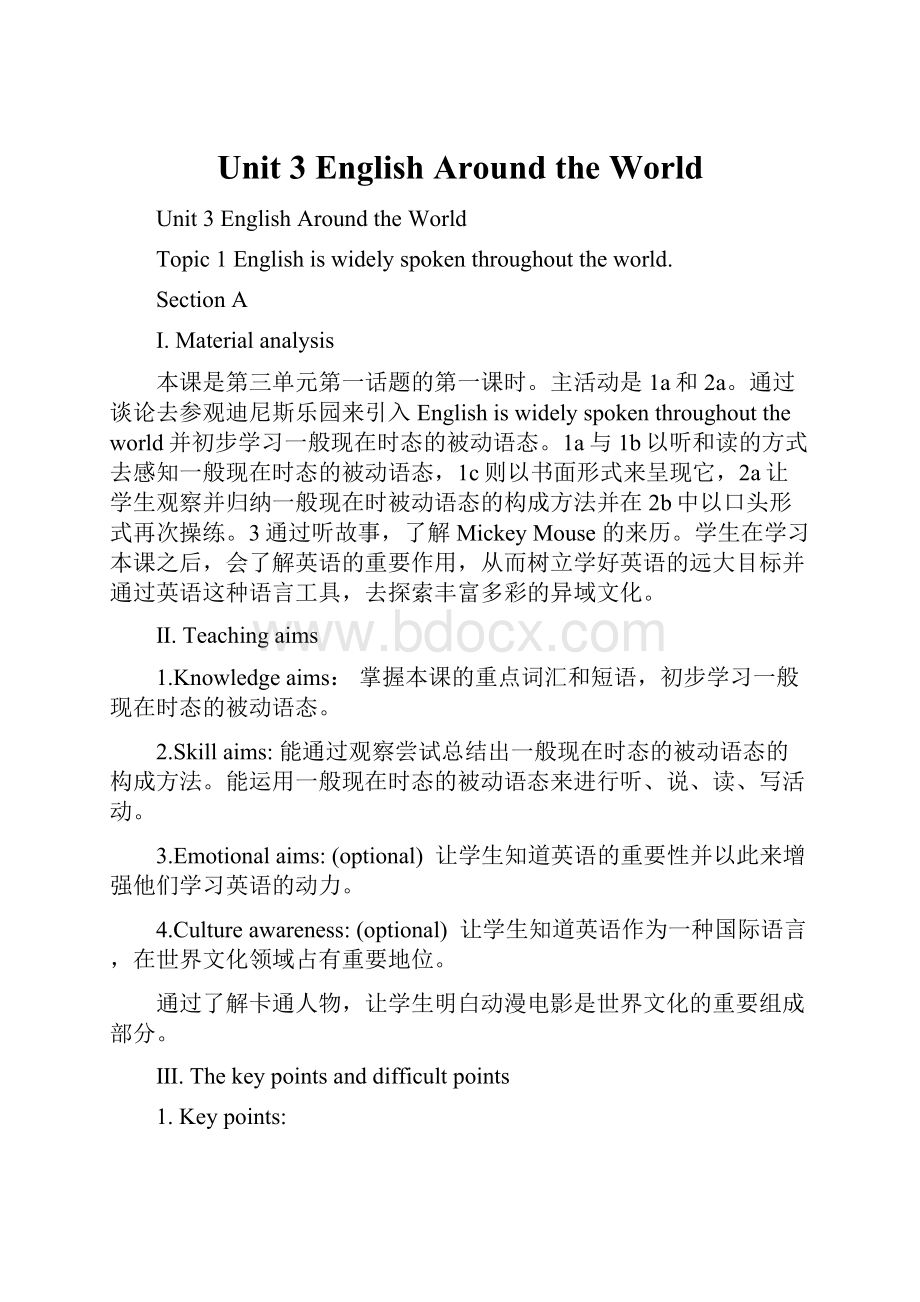Unit 3English Around the World.docx
《Unit 3English Around the World.docx》由会员分享,可在线阅读,更多相关《Unit 3English Around the World.docx(43页珍藏版)》请在冰豆网上搜索。

Unit3EnglishAroundtheWorld
Unit3EnglishAroundtheWorld
Topic1Englishiswidelyspokenthroughouttheworld.
SectionA
Ⅰ.Materialanalysis
本课是第三单元第一话题的第一课时。
主活动是1a和2a。
通过谈论去参观迪尼斯乐园来引入Englishiswidelyspokenthroughouttheworld并初步学习一般现在时态的被动语态。
1a与1b以听和读的方式去感知一般现在时态的被动语态,1c则以书面形式来呈现它,2a让学生观察并归纳一般现在时被动语态的构成方法并在2b中以口头形式再次操练。
3通过听故事,了解MickeyMouse的来历。
学生在学习本课之后,会了解英语的重要作用,从而树立学好英语的远大目标并通过英语这种语言工具,去探索丰富多彩的异域文化。
Ⅱ.Teachingaims
1.Knowledgeaims:
掌握本课的重点词汇和短语,初步学习一般现在时态的被动语态。
2.Skillaims:
能通过观察尝试总结出一般现在时态的被动语态的构成方法。
能运用一般现在时态的被动语态来进行听、说、读、写活动。
3.Emotionalaims:
(optional)让学生知道英语的重要性并以此来增强他们学习英语的动力。
4.Cultureawareness:
(optional)让学生知道英语作为一种国际语言,在世界文化领域占有重要地位。
通过了解卡通人物,让学生明白动漫电影是世界文化的重要组成部分。
Ⅲ.Thekeypointsanddifficultpoints
1.Keypoints:
Wordsandphrases:
cartoon,character,widely,foreigner,fromnowon
Sentences:
Ican’twaittoflythere!
Tryyourbestandworkmuchharderfromnowon.
Grammar:
Simplepresentpassivevoice
2.Difficultpoints:
能正确地以口头和书面形式把一般现在时态的主动语态变成一般现在时态的被动语态。
能正确地运用动词的过去分词,尤其是不规则动词的过去分词。
Ⅳ.Learningstrategies
通过不同的构词法来培养学生猜测生词的能力。
通过引导学生在听前阅读1b,培养学生形成听前熟悉、预测听力材料的习惯。
通过2a来培养学生的观察和归纳能力。
Ⅴ.Teachingaids图片/录音机/幻灯片/影像资料等。
Ⅵ.Teachingprocedures
Stage
(timeperiod)
Interaction
patterns
Teacheractivity
Studentactivity
Remarks
1
Gettingstudents
readyforlearning
(2-3mins)
Classactivity
PresentsomepicturesofplacesofinterestsuchastheGreatWall,theGreatPyramids,theBigBen,theDisneyland,etc.GettheSstospeakoutthenamesandthecountrieswheretheylie.
T:
Hi,boysandgirls!
Lookatthispicture.Doyouknowit?
Ss:
It’sDisneyland.
T:
Right.Whereisit?
Ss:
It’sinLosAngeles.
Speakoutthenamesoftheplacesofinterestandthecountrieswheretheylie.
Ss:
It’sDisneyland.
Ss:
It’sinLosAngeles.
...
尽可能用学生已经学习过的名胜,让学生能够用英语说出来,增强他们的自信心。
当学生在说“Disneyland”,“LosAngeles”有困难时,教师要适时板书并教读,以降低他们在听1a时的难度。
2
Revision
(5mins)
Groupwork
LettheSsdiscusswheretogoiftheyhaveachancetogoabroad.Thenencouragethemtoreport.
T:
Ifyouhaveachancetogotoothercountries,whichcountryareyougoingtovisit?
Nowdiscussinyourgroupandthenreporttotheclass.Youmaybeginlikethis“Wearegoingtovisit....,becausewe...”
Discussingroupsandchooseamembertogiveareportasfollows:
S1:
WearegoingtovisitEgypt,becauseEgyptisoneofthe“FourAncientCivilizations”andwecanvisittheGreatPyramids.
S2:
WearegoingtovisittheU.S.AbecausewecanvisitDisneyland.
如果有条件,老师可以在大屏幕上展示一幅世界地图,帮助学生减少选择的时间。
老师可以预先准备一些世界名胜的图片。
如果学生不能正确用英语表达,老师可以用英语展示出来。
3
Pre-listening
(5-6mins)
Classactivity
Individualwork
Individualwork
Step1:
Brainstorming:
PresentmanypicturesofcartooncharactersandlettheSsspeakouttheirnames.
T:
Lookatthiscartooncharacter(writethemdownontheBb).What’sthenameofit?
Ss:
...
Step2:
LettheSsreadthestatementsin3onpage56.EncouragetheSstoguessthemeaningsandpronunciationsof“film-maker,garage”byword-formationandpicture.Teachergiveshelpifnecessary.
ThenlettheSslistentothetapeandmarkT/F.Listentwiceandchecktheanswerstogether.Finish3.
T:
DoyouwanttoknowwhocreatedMickeyMouse?
Let’slistentoastoryandfindtheanswer.
Step3:
LettheSsreadthequestionsin1bbeforelisteningto1aandtrytomakeclearwhattheyaregoingtopayattentionto.
T:
Readthequestionsin1bandfindoutwhatyouaregoingtopayattentionto.
Lookatthepicturesandspeakoutthenamesasquicklyaspossible.
S1:
TheyareTomandJerry.
S2:
It’sMickeyMouse.
S3:
It’s...
Readandguessthemeaningsandpronunciations.
S1:
film:
电影
S2:
maker:
制作的人、制作者
S3:
film-maker:
电影制作人
S4:
garage:
车库
ListentothetapeandmarkT/Fandthenchecktheanswers.
Readthequestionsin1b.Putuphandsafterfinishingreading.
老师应当把所出示的图片集中展示出来,以便引导学生猜测、说出或老师点出本课的重点词汇“cartoon,character”,为听1a扫清词汇障碍。
一定要有米老鼠的图片,待学生说出MickeyMouse以后要及时板书在黑板上。
4
While-listening
(6mins)
Individualwork
Individualwork
Step1:
LettheSslistento1aonceanddo1balone.
T:
Listentothetapecarefullyandticktheanswers.
Step2:
LettheSslistento1aagainandfillintheblanksin1c.
T:
Listento1aagainandfillintheblanksasquicklyaspossible.Youcanwritejustafewlettersatfirstandthenfinishthemafterlistening.
Listento1aonceanddo1balone.
Listento1aandfillintheblanksin1casquicklyaspossible.
在听完1a后,老师不要马上核对答案,让学生通过阅读来自己核对答案,这样可以让学生带着问题去阅读。
在学生做1c时,建议学生采用速记的方式。
听完录音以后再完善答案。
速记是学生在学习英语时应当掌握的技巧。
5
Post-listening
(20mins)
Pairworkandclassactivity
Groupwork
Individualwork
Individualwork
Groupwork
Step1:
LettheSschecktheanswersto1band1cwiththeirpartners.Then,checktheanswerstogether.Finish1b.
T:
Read1aandchecktheanswersto1band1cbyyourself.Then,checkwithyourpartner.Ifyoufinishchecking,putupyourshands.
T:
Nowlet’schecktogether.
Step2:
LettheSsread1aagainandunderlinethepassivevoice,thenewwordsandtheusefulphrasesandsentences.EncouragetheSstoguessthepronunciationsandmeaningsof“widely,throughout,fromnowon”.WritedownsomekeypointsontheBb.
Step3:
LettheSsobservetheanswersin1canddiscussingroupsandthenreporttheirfindings.Finish1c.
T:
Lookattheanswersin1candpayspecialattentiontotheforms.Discussinyourgroupandthenreportyouropinions.
Step4:
LettheSsstudytheexamplein2aandtrytocompletethesentences,andfindouthowtochangetheactivevoiceintothepassivevoice.AsktheSstoguessthemeaningof“foreigner”by“foreign+er”.Checktheanswers.Finish2a.
T:
Studytheexamplein2aandtryyourbesttocompletethesentences.
Step5:
LettheSsplaythegameingroupsofthreebyfollowingtheexamplein2b.MakesuretheSsunderstandhowtoplaythegame.
T:
Lookattheexamplein2bandthenplaythegameingroupsofthree.
Checktheanswerto1band1cinpairs.
Readandfindoutthekeypointsanddifficultpoints.
S1:
EnglishisspokenasthemainlanguageinAmerica.
S2:
It’salsowidelyusedthroughouttheworldnow.
S3:
Ican’twaittoflythere.
Observeanddiscuss1c.Thenchooseamembertoreport.
S1:
Wefindtheyhavethesamestructure“be+pp”.
S2:
..
Studyandfindouttherule.
S1:
Ithinktheruleis“sth/sb+be动词+by+pp”
S2:
Ithinkthe“beverb”canbe“am,isorare”
S3:
...
Playthegamein2b.
GroupOne:
S1:
WangWeitakesmypen.
S2:
Mypenistaken.
S3:
MypenistakenbyWangWei.
GroupTwo:
S1:
...
与同伴互相检查可以增强基础好的学生的成就感,也可以减轻基础差的学生害怕出错的心理负担。
新课标倡导让学生通过感知、体验、观察、归纳、总结来学习语言知识(尤其是语法)。
老师在学生基本说出“be动词+PP”这个概念时,要马上用中英文板书并明确告诉学生这就是本话题的语法重点——一般现在时态的被动语态。
然后与学生一起总结一般现在时态的被动语态的构成方法。
在2a部分,老师不要急着把规律直接告诉给学生,应该让学生自己去发现,这样才能成为他们自己的东西,不要填鸭式地灌输。
待学生找出规律后,老师再进行讲解。
为了让学生明白怎样玩这个游戏,老师可以和基础好的学生做个示范。
老师最好在黑板上或者PPT上准备好第一个句子,这样可以节约时间。
让学生自己发现问题、解决问题,才能体现自主学习。
6
Summarizingandassigninghomework
(5mins)
Classactivity
Step1:
Sumupthemaincontentofthisclassandthekeypoints
T:
Let’sgothroughwhatwehavelearnedtoday.
Step2:
HMK:
1.Makefivesentenceswiththesimplepresentpassivevoice.
2.Findouttheanswersto1conpage55.
speakoutthekeywords,phrases,sentencesandgrammarpoints.
S1:
cartoon,character,...
S2:
Widely,throughout,...
S3:
fromnowon,haveachancetodosth.
把1c当家庭作业,可以让学生有充足的时间去求证,为下次课节省时间。
Ⅶ.Blackboarddesign
Englishiswidelyspokenthroughouttheworld.
SectionA
Wordsandphrases
Disneyland
LosAngeles
Cartooncharacter
Foreignerwidely
Throughoutfromnowon
Grammar:
thesimplepresentpassivevoice
Structure:
be+pp
Sentences:
Ican’twaittoflythere.
Tryyourbestandworkmuchharderfromnowon
Englishisspokenwidely...
It’salsowidelyused...
SectionB
Ⅰ.Materialanalysis
本课是九年级第三单元第一话题的第二课时,主活动是1a和4。
通过谈论去古巴出差来引出语言的差异性和重要性,并继续学习一般现在时态的被动语态。
1a、1b以听、读的方式去引出officiallanguage,1c则让学生找出更多国家的官方语言,从而扩展学生的知识面,知道语言具有多样性。
3以听故事的形式来说明英语的广泛性。
2和4则是为了强化本课的语言知识。
通过学习本课,学生要知道在许多国家,语言有官方语言和非官方语言,并认识到语言文化在沟通交流中的重要性。
Ⅱ.Teachingaims
1.Knowledgeaims:
掌握本课的重点词汇和短语,继续学习一般现在时态的被动语态。
2.Skillaims:
能通过观察课文插图来猜测课文内容。
能运用一般现在时态的被动语态进行看图写句子。
能正确地运用强读和弱读技巧,使句子更加抑扬顿挫,富有韵律感。
3.Emotionalaims:
(optional)让学生知道语言的重要性和多样性,从而增强学生学习语言的欲望。
4.Cultureawareness:
(optional)通过Jane和她爸爸的对话,让学生了解异国文化在沟通中的重要作用。
Ⅲ.Thekeypointsanddifficultpoints
1.Keypoints:
Wordsandphrases:
tonight,communicate,conversation,explain,impossible,divide,dig,lay,bepleasedwith,onbusiness,besimilarto,have(no)troubledoingsth.,introuble,ask...forhelp.
Sentences:
Haveagoodtrip!
Iwishyousuccess!
Grammar:
Simplepresentpassivevoice
2.Difficultpoints:
能熟练地运用一般现在时态的被动语态进行句型转换(如:
把肯定句变成疑问句等)。
能正确地运用强读和弱读技巧。
Ⅳ.Learningstrategies通过课文插图来培养学生的想象力。
通过构词法、英语释义、语境来培养学生猜测生词的能力。
通过引导学生在听前阅读3的问题,培养学生形成听前熟悉、预测听力材料的习惯。
Ⅴ.Teachingaids联合国总部和潘基文的图片,日文的药品说明书/录音机/幻灯片等。
Ⅵ.Teachingprocedures
Stage
(timeperiod)
Interaction
patterns
Teacheractivity
Studentactivity
Remarks
1
Gettingstudentsreadyforlearning
(2mins)
Classactivity
PresentapictureoftheUNheadquarterorapictureofPanJiwen.DiscussingroupsandlisttheofficiallanguagesusedinUN.Encouragethestudentstospeakthemout.
T:
Doyouknowwhatthisis?
T:
Whoishe?
T:
Great!
DoyouknowwhatlanguagesareusedintheUN?
NowdiscussingroupsandtrytonametheofficiallanguagesusedinUN.
Discussandspeakoutthelanguages.
S1:
It’stheUN.
S2:
PanJiwen.
S3:
English.
S4:
Russia.
S5:
Chinese.
S6:
...
老师可以把多种语言的名词通过小黑板或者屏幕准备好,以降低难度。
最后老师一定要给出正确的答案并教读:
Chinese,English,French,Russia,SpanishandArabic.
2
Revision
(5mins)
Groupwork
Individualwork
Step1:
LettheSslookat